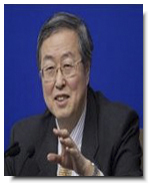The 23rd ZHM Lecture -the latest of the series
- was held at SBP, Karachi on April 19, 2019.
This year's lecture was delivered by Dr. Zhou
Xiaochuan on "Lessons from the Role of
People's Bank of China in China's Economic Rise".
Dr. Zhou served as Governor
of People's Bank of China (PBoC) during 2002-2018
- the longest-serving central bank governor
in China’s history. During his tenure,
China became the second largest economy in the
world, and a consequential player in global
financial markets. He also served as the Chairman
of the Monetary Policy Committee of the PBoC
from 2003 to 2018. Currently, he acts as a member
of the Group of Thirty (G30) and Chinese Economists
50 Forum, besides maintaining teaching positions
at Tsinghua and other institutions. Dr. Zhou
remained a strong advocate for effective regulation
of banks, including maintaining higher reserves;
and called for global financial reforms, notably
reduction in dependency on the USD at the International
Monetary Fund in favour of a multinational currency
reserves. |

|
Dr. Zhou established himself
as a scholar, publishing numerous papers and
books that reflected his reformist bent, including
“March Towards an Open Economic System”,
and “Addressing Risks During Transformation”.
He also won the UK's 2019 Central Banking lifetime
achievements award. He is widely recognized
for his contributions to push through fundamental
changes that transformed China from a centrally
planned to a market-based economy.
In his lecture, Dr. Zhou touched
upon several issues pertaining to central banking
including objectives of a central bank, the
communication strategy, the role of central
bank in development of foreign exchange, derivative,
stock exchange and corporate bonds markets,
and the significance of fiscal discipline in
enhancing monetary policy effectiveness. He
also highlighted the role of PBoC in the process
of re-structuring of financial institutions
in China. He argued that reforms in PBoC reflect
China’s gradualist approach towards globalization
for sustainable economic development. He emphasized
on gradual liberalization of exchange rate,
monetary and capital account regimes to facilitate
greater role for market forces without large-scale
disturbances. He also elaborated how PBoC provided
incentive structures to channelize financial
resources toward productive sectors to ensure
inclusive growth and financial stability.
In case of Pakistan, Dr. Zhou emphasized to
raise the domestic savings rate in order to
address most of the macroeconomic imbalances
including current and fiscal deficits. Further,
he suggested to use regional currencies in order
to facilitate trade in the region.
|